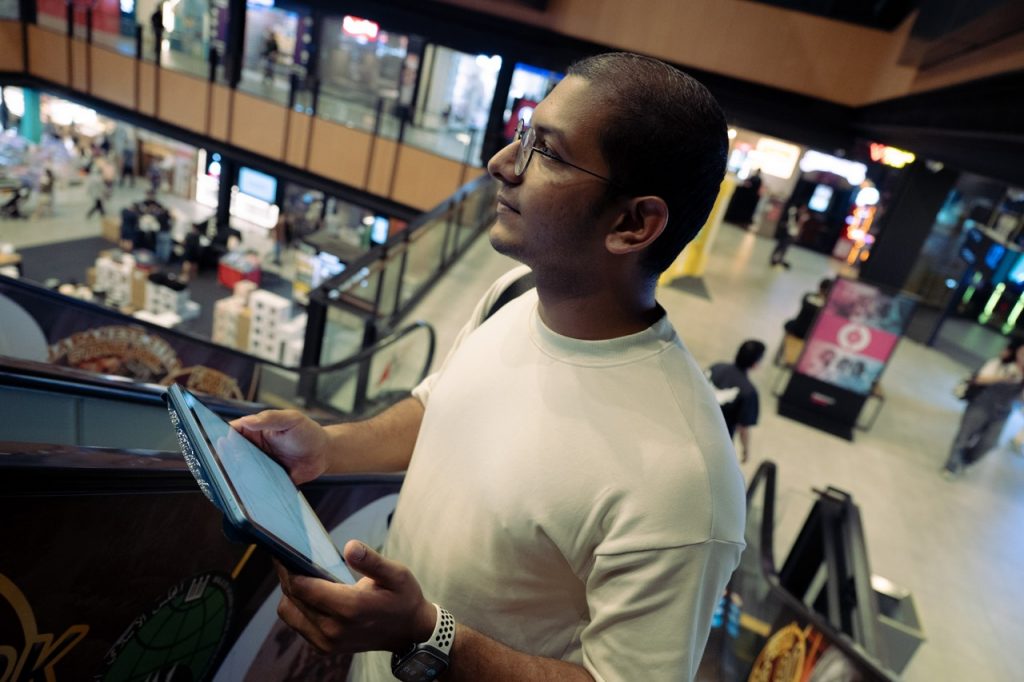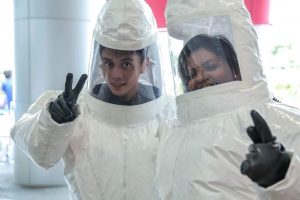This story is brought to you by PSB Academy.
All images by Xue Qi Ow Yeong and Justin Tan for RICE Media.
Beads of perspiration trickle down the side of her face as Nooraishah Rahmat tinkers with the airplane engine in front of her. Her hands are grimed up with grease, her jumpsuit covered in oil. But as a machinist at GE Aerospace, it’s all in a day’s work for the 34-year-old.
Physically exhausted, she clocks off work a little after 4 PM. After making her way out of ulu Seletar, she arrives home only to be faced with a pile of school work and assignments on her desk.
While she has been with GE Aerospace since 2018, it was only in November 2023 that she took up a degree in Electromechanical Engineering with Coventry University.
Thankfully, she no longer has to juggle school and work—for now at least. Aishah finally graduated in February and is now working towards taking her Master’s degree.
Over the course of seven years, she has had to split her time between fixing plane parts and studying to become a specialist in using fluorescent penetrant inspection (FPI) technology to inspect aerospace vehicles like planes, spacecraft, and satellites.
Her notes—focused on detecting structural flaws and material defects—are essential training for ensuring the safety of these high-tech machines that soar through the skies and venture into space.

Though Aishah has always wanted to work in the aerospace industry, her qualifications have always been in electrical or mechanical engineering—nothing related to aerospace.
So, where does the aerospace part fit in?
Aishah explains. “It’s all about progression. My qualifications in electrical and mechanical engineering add value when I deal with circuits, control, and power systems, and in the future, I’ll further my studies in niche areas like aeronautics. It’s a good balance.”
While Aishah’s heart was always set on the aerospace industry, being in the cybersecurity industry never crossed Shafeek Ahamed’s mind. In fact, the 24-year-old had big dreams about being a pilot.
Now, he’s armed with a degree in Cybersecurity and Ethical Hacking, after graduating in 2022 from Coventry University.
Though he agrees that having a degree will get one foot through the door in your career, it is more about the skill sets he’s learnt along the way.

While he used to possess a more narrow-minded view, focusing more on where his degree would be coming from or what qualifications he would need, Shafeek has a different take after joining the workforce.
“It’s about doing more than just day-to-day schoolwork or getting more and more certifications. What’s more important is improving your own skill sets and finding your niche.
“Everybody is replaceable. But at least, with a unique skill set and experience under your belt, it makes you less replaceable,” he chuckles.
STEM opportunities are plentiful, driven by the promise of financial reward and government support. Yet, deep-rooted fears about job security in a rapidly changing global economy persist, amplifying pressure on the younger generation. Add economic uncertainty into the mix, and it’s a perfect storm of anxiety.
It’s a dog-eat-dog industry with everyone vying for a spot in a coveted tech company or fighting for a salary that would be the talk of every family gathering.

Though Shafeek and Aishah are holding their own in their respective careers now, their journey was riddled with doubt.
Aishah continued to fight the glass ceiling that still exists, despite certain initiatives. Shafeek’s lack of technical skill left him wondering if it would be a setback for someone wanting to pursue a career in the IT field.
Job Hunts
Aishah recalls a time when she contemplated not furthering her studies at all. Her dad passed away when she was 18, and her mum struggled with depression. The onus fell on her to support both her younger brothers, then 16 and 10, through school.
“I did try to further my studies while juggling part-time work then, but our financial situation took a beating and I had to find another way out,” Aishah says despondently.
She knew she had to find a job and earn well enough to take over the role as the family’s sole breadwinner. And so she did at GE Aerospace.

Coincidentally, GE Aerospace provides scholarships to encourage upskilling among its employees. Buckling down, she did extensive research into the courses and modules at PSB Academy and scanned through the tuition fees. Knowing that her company was willing to sponsor her further studies, she immediately sent the application to her human resources department.
“I only considered it because PSB Academy offered an option for part-time courses, which is more accommodating for those who work full time. Financially, I knew I needed to support my family, but upgrading myself was just as important,” Aishah says.
Shafeek scrolls through the non-stop alerts beeping away on his phone. He’s anticipating a call that could tell him that he needs to drop everything and fix a problem at work. Surprisingly, for someone in the cybersecurity industry, Shafeek hates sitting in front of a laptop for long hours.
He’s an ambivert, he says. “I’m not a technical person. I’m more into project management or dealing with people. I prefer mingling around with other tech-savvy individuals or networking.”

Finding his way around the technical aspect of IT was one of his biggest challenges while pursuing his degree.
Though his social nature helped him with his soft skills—networking and organising events with the cyber community in PSB Academy—he knew he needed to up his technical game.
“I can draw up a cyber policy in seconds if you asked me to, but not when it comes to Intermediate Digital Forensics (IDF). I’ll spend hours just on the research alone,” he laughs, embarrassed.
Coventry University’s curriculum focuses on theory for most of the semester, though the students have an opportunity to explore their practical knowledge in the last few modules.
Shafeek reached out to a group within the cyber community at PSB Academy—a mix of other students from Coventry University, and current batchmates and seniors.
“We only interact for cyber-related things and learn from each other. It’s what really helped me improve my technical skills. This aspect of cross-batch learning within PSB Academy became my support pillar,” he says.
Determination Kills Doubt
Aishah remembers walking into her class at PSB Academy in 2023, and to no surprise, she was the only girl. Unfazed, she says, “I know the industry is more male-dominated. Even since my time in ITE, I was more or less the only female in my class.”

Despite being the only woman in her lecture hall, her classmates treated her like an equal. Her lecturer could also see how determined she was and recognised her efforts, encouraging her and guiding her when needed.
Being in a part-time class has its perks. Aishah’s classmates all came from different backgrounds in the working world. Since she was always thinking one step ahead and wondering what’s next, their input on the different areas of engineering really helped motivate her.
They’d ask her: “What path do you want to take?” It prompted her to self-reflect and really deep dive into the possibilities within the engineering field.
But Aishah was not always this confident. A self-proclaimed tomboy with two brothers in tow, she recalls how she was always bullied in primary and secondary school. So much so, her mum had to step in.
She’d had enough by the time she entered ITE. “I didn’t want to be quiet anymore.”
Aishah became more straightforward and vocal, no longer letting her classmates push her around. “It didn’t matter what they said anymore,” she says firmly. “I was there to prove that I was just as good as the men, if not better.”
To no surprise, her first day at GE Aerospace was no different. The whispers of “Young girl, sure or not?” and “Will she stay for long?” were common.

But Aishah kept her head down as she went about her daily tasks at work. She wasn’t worried despite the age gaps between her and her senior colleagues. Instead, she embraced the opportunity she had to share and exchange her knowledge with them.
With that in mind, she developed stronger working relationships with her colleagues by sharing her knowledge and helping them improve their workflow.
“I’d introduce them to newer, more efficient working methods, encouraging them to be open-minded and use other alternatives,” she smiles proudly.
Real Skills Matter
On his end, Shafeek kept himself busy throughout his time at Coventry University. Besides spending time in front of his laptop, drowning in theories, he flitted around to network and interact with different students—extremely befitting for a social butterfly.
But as graduation day loomed near, the pressures of finding a job in his industry grew more imminent.
He found himself splitting his time between his final year project and countless tabs on his browser as he furiously applied for jobs in cybersecurity.

“My friends said I was lucky to find a job within a week of finishing my course, but only I know how much of a struggle I went through,” he says reluctantly.
While his friends saw the end result, Shafeek’s mind was filled with questions: Will my private degree hold value? Will I be able to get a pay that’s justifiable based on my experience?
He even went as far as to strategise how he applied for jobs, spending more time and effort crafting cover letters and tailoring his resume for the ones he really wanted.
At the end of the arduous process, it wasn’t the strength in theoretical knowledge or whether a private or public degree mattered to his employer. It was his experience outside of the books that truly impressed them.
“I’m relieved that PSB Academy offered such a range of community activities, workshops, career fairs and even internship opportunities for my course. My internship definitely helped expose me to real-life problems, and I gained new skills from it,” he says gratefully.

Stepping into STEM
Though Shafeek and Aishah can now enjoy the fruits of their labour, their struggles align with the anxieties other students face on their quest to reach the pinnacle of success both academically and in their careers.
There’s the fear of failure, the possibility of ‘not measuring up’, and then the daunting process of having to apply for job after job, wondering if they’ll be good enough to even be considered.
It’s overwhelming, especially when sustaining a ‘good career’ is about the continual quest of proving one’s worth.
While there are roles in STEM that allow you to work from the ground up and earn your place in the ranks, Shafeek emphasises that the path to success in the industry is a standard set by the world. It’s an era where you can no longer rest on your laurels and coast, especially in the rapidly changing fields of tech and engineering.
“To grow a career up to the managerial level, sometimes you might even need a Master’s!” he exclaims.
“Still, it’s important to remember that your education path is a personal adventure and there’s no one-size-fits-all path to success. It’s okay to be a work in progress. Embrace your own pace and trust that building your future—with all its unique twists and turns—is exactly how it’s meant to be.”







